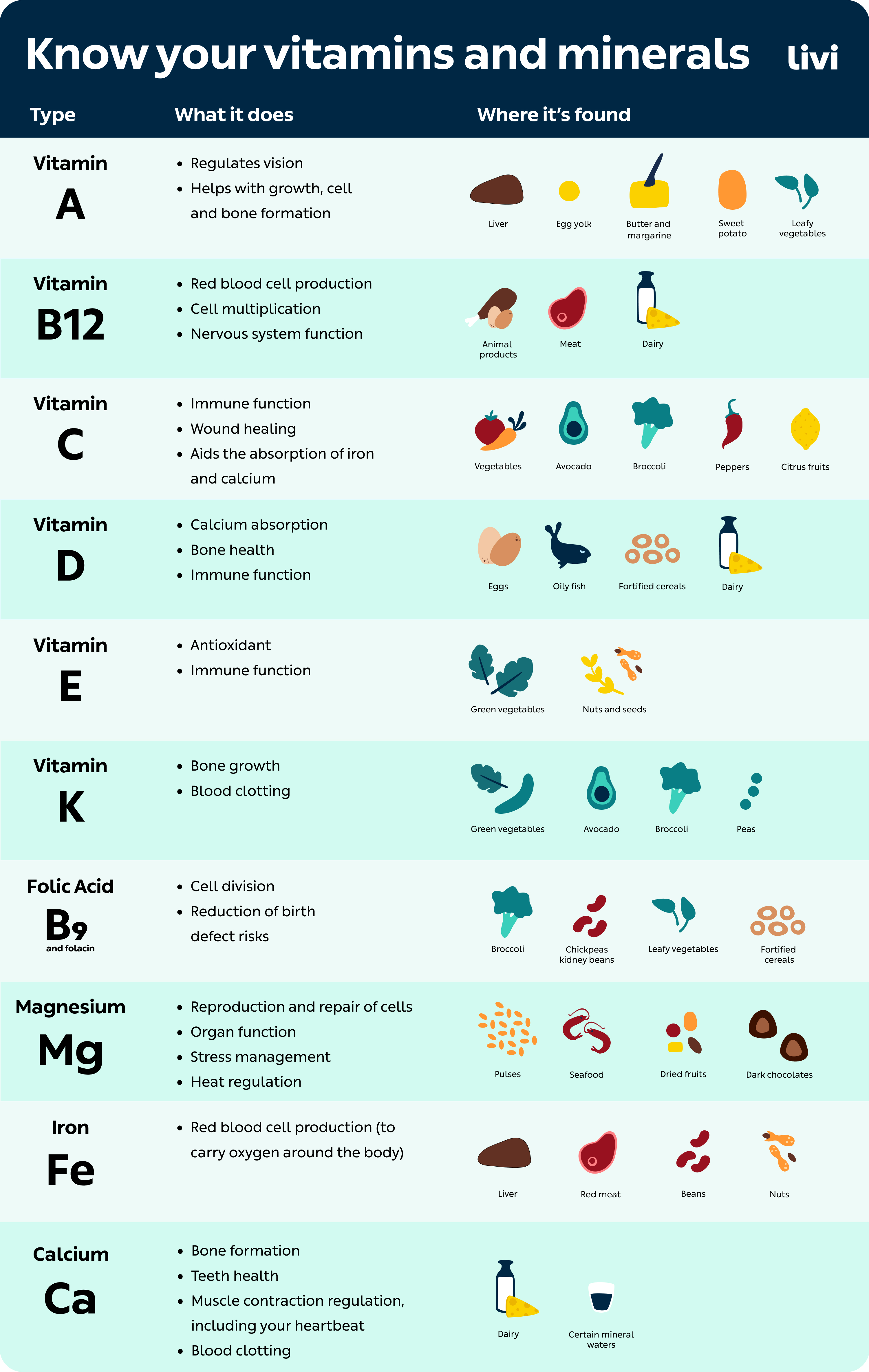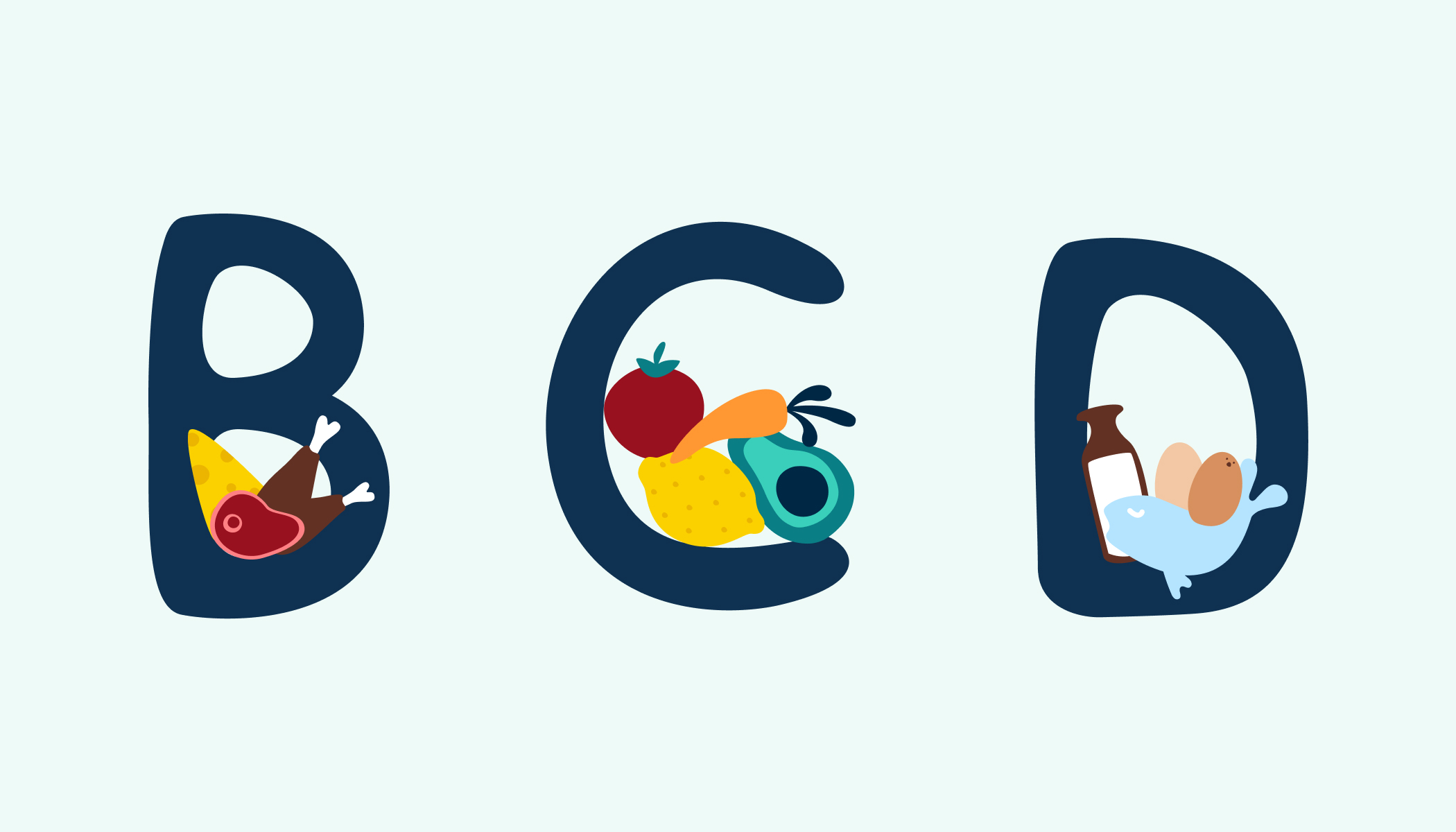More of us are considering adding vitamin supplements to our diet, but vitamin deficiencies are actually quite rare. ‘Healthy adults who eat a varied, balanced diet and get a little bit of sunshine every day usually get all the vitamins and minerals they need,’ says Dr Céline Guyomar, a Livi medical doctor.
‘Keeping your diet varied is important, as no one type of food guarantees that you get enough of everything.’
If you suspect that you might need vitamin supplements, talk to a doctor first. ‘There are risks involved, particularly for children, and some supplements can interact with other medications,’ says Dr Guyomar.
What are vitamins and minerals, and why do we need them?
‘Vitamins and minerals belong to the micronutrient family and are essential for the body to function well,’ says Dr Guyomar. ‘They have a role to play in the nervous, immune and muscular systems as well as in vision, growth and more.’
The body needs 13 different types of vitamins as well as a number of minerals and trace elements. The vitamins include:
Vitamins A, C, D E and K B vitamins (thiamine, riboflavin, niacin, pantothenic acid, biotin, B6, B12 and folate)
‘Our bodies don’t create vitamins – with the exception of vitamin D, which we produce from the UV rays of the sun, and vitamin K, produced by bacteria in the body – so, we have to get them through food,’ says Dr Guyomar.

What are the signs of a vitamin deficiency?
The symptoms of a deficiency largely depend on the type of vitamin and how severe your deficiency is. ‘Symptoms will develop more quickly if you become deficient in the kinds of vitamins the body can’t store as easily, like vitamin C or folic acid,’ says Dr Guyomar.
General vitamin deficiency symptoms include:
- Tiredness
- Being prone to infections
- Headaches
- Bleeding gums
- Very dry skin and cracked lips
- Brittle hair and nails
- A swollen and inflamed tongue
- Digestive disorders like diarrhoea
Do I need to take vitamin supplements in the winter?
‘Taking vitamin D supplements in winter is definitely a good idea,’ says Dr Guyomar. This is because the reduced sunlight during winter increases our risk of vitamin D deficiency.
Many parents choose to give their children vitamins to boost their immunity in the winter, and some studies have shown that vitamin C may help defend against and fight viral and bacterial infections.
What vitamin supplements should I take?
It’s good to be aware of these different types of vitamin and mineral supplements:
Vitamin D
Who should take it? Everyone, including children, those over the age of 80, people with dark skin and anyone whose exposure to the sun is limited
When? Daily, or a high dose every 2 or 3 months, from November to April
Vitamin D is important for calcium absorption, which helps keep your bones healthy. ‘It also plays a key role in supporting your immune system,’ says Dr Guyomar.
The amount and strength of the sun in the winter months isn’t enough to produce all the vitamin D we need. It’s also very hard to get it from our diet alone. So, the advice is that everyone takes at least 10 mcg (400 IU) daily during winter.

Vitamin A, C and E
Who should take it? Children and people recommended by a doctor to take a supplement
When? As per a doctor’s recommendation, but usually for no more than 3 months
- Vitamin A ‘Vitamin A is needed to regulate vision and allow our genes to convert DNA into useful products like protein,’ says Dr Guyomar. ‘The first sign of a vitamin A deficiency is that it takes longer for your vision to adapt at night.’
- Vitamin C ‘Vitamin C is essential,’ says Dr Guyomar. ‘It helps fight infection, helps with the absorption of iron and calcium, and generally helps protect the body’s cells and heal wounds. Consuming foods high in vitamin C, like avocado, citrus fruits and potatoes with the skin on, daily is usually enough. Store them in the fridge and eat them raw or steamed, as vitamin C is sensitive to light, heat and air.’
- Vitamin E Vitamin E, a powerful antioxidant, is found in seeds and oils, and deficiency is extremely rare.
These vitamins are often part of children’s multi-vitamins. They’re given as a precaution to make sure that growing children – especially those who are fussy eaters or don’t get a varied diet – receive all the vitamins they need.
Vitamin K
Who should take it? Babies
When? At different times throughout development Babies are born with insufficient levels of vitamin K, which is necessary for blood clotting. That’s why newborns are given vitamin K at birth, on day 4 of their lives, and when they’re 1 month old if they’re not formula-fed.
Folate and folic acid
Who? Pregnant people and people trying to conceive
When? Daily Folic acid is one of the key pregnancy vitamins. ‘Folic acid is involved in cell division and very important in the prevention of neural tube defects, which is why people who want to get pregnant and those in early pregnancy should take a supplement,’ explains Dr Guyomar.
Taking folic acid in the period before conception has been shown to reduce neural tube defects in babies by up to 70%.
Vitamin B12
Who should take it? Vegans, vegetarians and people who suffer from Biermer’s disease, intestinal disease or have a known deficiency
When? Daily or monthly, depending on a doctor’s advice
‘Vitamin B12 is necessary for the production of red blood cells, for cell multiplication and for the proper functioning of the nerves,’ says Dr Guyomar. It can only be found naturally in animal foods, which is why vegans and vegetarians are at a higher risk of deficiency.
What about minerals and other supplements?
‘Minerals, or trace elements, are also key micronutrients. Like vitamins, you get them through food, and they play an important role in all the body’s functions,’ says Dr Guyomar.
All minerals are important, but deficiencies are more common in these:
Magnesium
‘Magnesium is involved in muscle energy intake, so it’s important for anyone who’s very active,’ says Dr Guyomar. ‘But it’s also used in all other energy-consuming operations of the body, including the reproduction and repair of our cells, the functioning of our organs, stress management and heat regulation.’
Certain alcoholic or caffeinated drinks can decrease its absorption, so it’s wise to keep these to a minimum.
Iron
‘Iron helps your red blood cells transport oxygen to your cells and is important for the development of the central nervous system in infants,’ says Dr Guyomar. Iron deficiency is common, especially in women around childbearing age and those with heavy periods. Vegans and vegetarians, children aged 6 months to 4 years, and people with health conditions that involve loss of blood are also at higher risk.
Calcium
‘Calcium is central to our bone health and plays a role in muscle contraction,’ Dr Guyomar explains. ‘It’s particularly essential during childhood and adolescence as our bones grow, as well as from around the age of 50 in women and the age of 60 in men.’
When do I need to speak to a doctor about deficiencies and vitamin supplements?
Talk to a doctor about vitamins and supplements if you:
- Are thinking about supplementing your diet with added vitamins or minerals
- Are pregnant or trying to conceive
- Think you’re experiencing vitamin deficiency symptoms, like anaemia, very dry skin or hair loss
This article has been medically approved by Dr Céline Guyomar, a medical doctor at Livi


